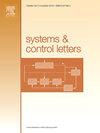A refined looped-functional for discrete-time Markov jump systems under aperiodic sampling
IF 2.1
3区 计算机科学
Q3 AUTOMATION & CONTROL SYSTEMS
引用次数: 0
Abstract
The looped-functional and its corresponding stability analysis approach have proven highly effective for continuous-time sampled-data systems. However, for discrete-time linear systems (DLS), the looped-function approach is still lacking. A discrete looped-functional approach is proposed to investigate the asymptotic stability of DLS with Markov parameters and aperiodic sampling. Firstly, the discrete-time sampled-data system is represented as a time-delay system by using the input delay approach. Furthermore, a relaxed equivalent asymptotic stability condition is proposed, which only requires that the system state tends to zero at ordered and non-adjacent discrete instants , which effectively simplify the complexity of the stability analysis. Moreover, for discrete-time systems under aperiodic sampling, based on the above equivalent condition, a novel discrete looped-functional is constructed. As an extension of the continuous looped-functional, the discrete looped-functional has the characteristic that its value is zero at and it does not impose strict constraint on the positive definiteness of the functional. By utilizing the less conservative looped-functional and the summation inequality, two asymptotic stability conditions are established. The validity of these results is verified by using a classical example, demonstrating a larger upper bound for the sampling interval compared to existing results.
非周期采样下离散马尔可夫跳变系统的改进环泛函
循环泛函及其相应的稳定性分析方法对连续时间采样数据系统是非常有效的。然而,对于离散时间线性系统(DLS),仍然缺乏环函数方法。提出了一种离散环泛函方法来研究具有马尔可夫参数和非周期采样的离散环泛函系统的渐近稳定性。首先,采用输入延迟法将离散采样数据系统表示为时滞系统。进一步提出了一个松弛的等效渐近稳定性条件,该条件只要求系统状态在有序非相邻离散时刻{tk}趋近于零,从而有效地简化了稳定性分析的复杂性。此外,对于非周期采样下的离散系统,基于上述等价条件,构造了一种新的离散环泛函。作为连续环泛函的推广,离散环泛函具有在{tk}处值为零的特点,并且对泛函的正确定性没有严格的约束。利用小保守环泛函和求和不等式,建立了两个渐近稳定条件。通过一个经典例子验证了这些结果的有效性,与现有结果相比,表明了更大的采样区间上界。
本文章由计算机程序翻译,如有差异,请以英文原文为准。
求助全文
约1分钟内获得全文
求助全文
来源期刊

Systems & Control Letters
工程技术-运筹学与管理科学
CiteScore
4.60
自引率
3.80%
发文量
144
审稿时长
6 months
期刊介绍:
Founded in 1981 by two of the pre-eminent control theorists, Roger Brockett and Jan Willems, Systems & Control Letters is one of the leading journals in the field of control theory. The aim of the journal is to allow dissemination of relatively concise but highly original contributions whose high initial quality enables a relatively rapid review process. All aspects of the fields of systems and control are covered, especially mathematically-oriented and theoretical papers that have a clear relevance to engineering, physical and biological sciences, and even economics. Application-oriented papers with sophisticated and rigorous mathematical elements are also welcome.
 求助内容:
求助内容: 应助结果提醒方式:
应助结果提醒方式:


